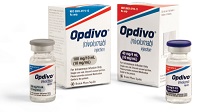 Bristol-Myers Squibb ($BMY) picked up FDA approval to use its new oncology treatment in lung cancer, significantly boosting the value of a therapy already expected to bring in billions each year.
Bristol-Myers Squibb ($BMY) picked up FDA approval to use its new oncology treatment in lung cancer, significantly boosting the value of a therapy already expected to bring in billions each year.
The FDA's latest approval of Opdivo, already cleared for melanoma, comes just days after the agency accepted Bristol-Myers' application and more than three months ahead of schedule. Bristol-Myers' treatment is designed to galvanize an immune system attack on tumors by blocking a pathway called PD-1, which, left unchecked, allows cancer cells to pass undetected by the body's natural defenses.
The agency's nod OKs Opdivo to treat squamous non-small cell lung cancer (NSCLC) that has advanced despite chemotherapy. Squamous patients account for about 30% of the NSCLC population, and Bristol-Myers is at work on a Phase III trial in the larger non-squamous group in hopes of further expanding Opdivo's label. Analysts have speculated Opdivo will bring in peak sales of around $5 billion a year, and Leerink's Seamus Fernandez believes its promise in lung cancer will take that figure as high as $7.3 billion by 2020.
With the approval, Bristol-Myers jumps ahead of Merck ($MRK), its closest rival in the PD-1 space. Merck's treatment, Keytruda, was first to market with a skin cancer approval last year, and the company is doggedly working to catch up in NSCLC. In January, Merck revealed that Keytruda was progressing ahead of schedule, in line for FDA application by mid-2015. And thanks to the therapy's "breakthrough" status at the FDA, Merck could pick up a lung cancer approval as soon as year's end, analysts figure.
Opdivo's speedy lung cancer approval is based on Phase II data in which it significantly increased rates of survival among patients with NSCLC. In January, Bristol-Myers divulged that, in a Phase III study pitting Opdivo against the standard cancer-killer docetaxel, the drug demonstrated such superior overall survival compared with the control arm that it hit its primary endpoint ahead of schedule, leading the trial's data monitoring committee recommend the study be terminated early.
The FDA's rolling review for Opdivo was by far the fastest for any treatment in recent memory and again affirms FDA oncology chief Richard Pazdur's penchant for rapidly approving cancer therapies that could improve the standard of care for some of the most dire patients.
"The FDA worked proactively with the company to facilitate the early submission and review of this important clinical trial when results first became available in late December 2014," Pazdur said in a statement. "This approval will provide patients and health care providers knowledge of the survival advantage associated with Opdivo and will help guide patient care and future lung cancer trials."
Opdivo's second trip through the FDA "is the fastest approval I've seen in my 15-year career," Evercore ISI analyst Mark Schoenebaum noted soon after the news hit. And it's an important one. Sketching out some raw sales forecasts for this indication, Schoenebaum concludes that the approval could be worth an additional $1 billion to $1.5 billion in sales. And more work is ahead to expand its dominance in lung cancer.
Behind Bristol-Myers and Merck, Roche ($RHHBY), AstraZeneca ($AZN), and partners Pfizer ($PFE) and Merck KGaA are bringing up checkpoint inhibitors that promise to change the standard of care for many cancers, a new class of therapies expected to bring in about $35 billion a year.
Like its rivals, Bristol-Myers is bankrolling an expansive R&D effort to determine Opdivo's potential in a wealth of cancers, launching combo trials in hopes of further extending the antibody's use.
"Our research program continues through an innovative and robust pipeline that includes more than 20 tumor types and through collaborations with other companies and researchers across the globe," R&D chief Francis Cuss said in a statement.
- read the release